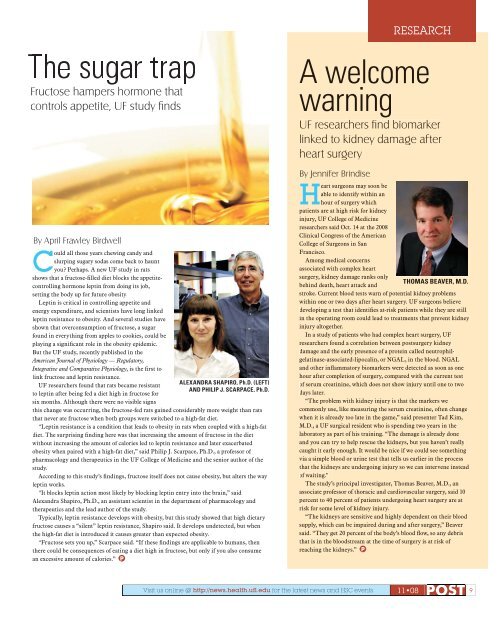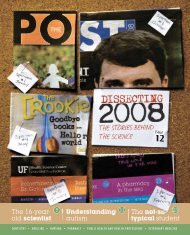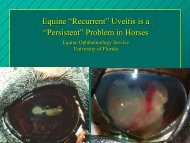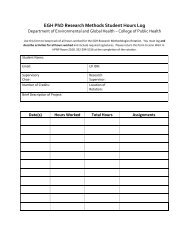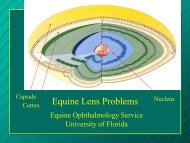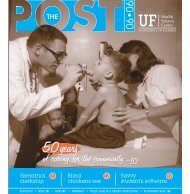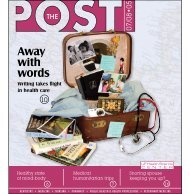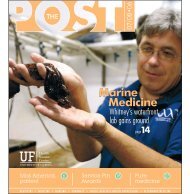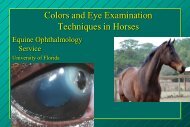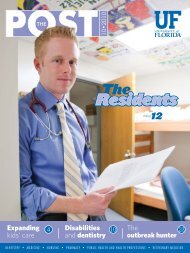POST - UF Health Podcasts - University of Florida
POST - UF Health Podcasts - University of Florida
POST - UF Health Podcasts - University of Florida
You also want an ePaper? Increase the reach of your titles
YUMPU automatically turns print PDFs into web optimized ePapers that Google loves.
RESEARCHTFructose hampers hormone thatcontrols appetite, <strong>UF</strong> study fi ndsBy April Frawley BirdwellCould all those years chewing candy andslurping sugary sodas come back to hauntyou? Perhaps. A new <strong>UF</strong> study in ratsshows that a fructose-filled diet blocks the appetitecontrollinghormone leptin from doing its job,setting the body up for future obesity.Leptin is critical in controlling appetite andenergy expenditure, and scientists have long linkedleptin resistance to obesity. And several studies haveshown that overconsumption <strong>of</strong> fructose, a sugarfound in everything from apples to cookies, could beplaying a significant role in the obesity epidemic.But the <strong>UF</strong> study, recently published in theAmerican Journal <strong>of</strong> Physiology — Regulatory,Integrative and Comparative Physiology, is the first tolink fructose and leptin resistance.<strong>UF</strong> researchers found that rats became resistantALEXANDRA SHAPIRO, Ph.D. (LEFT)AND PHILIP J. SCARPACE, Ph.D.to leptin after being fed a diet high in fructose forsix months. Although there were no visible signsthis change was occurring, the fructose-fed rats gained considerably more weight than ratsthat never ate fructose when both groups were switched to a high-fat diet.“Leptin resistance is a condition that leads to obesity in rats when coupled with a high-fatdiet. The surprising finding here was that increasing the amount <strong>of</strong> fructose in the dietwithout increasing the amount <strong>of</strong> calories led to leptin resistance and later exacerbatedobesity when paired with a high-fat diet,” said Philip J. Scarpace, Ph.D., a pr<strong>of</strong>essor <strong>of</strong>pharmacology and therapeutics in the <strong>UF</strong> College <strong>of</strong> Medicine and the senior author <strong>of</strong> thestudy.According to this study’s findings, fructose itself does not cause obesity, but alters the wayleptin works.“It blocks leptin action most likely by blocking leptin entry into the brain,” saidAlexandra Shapiro, Ph.D., an assistant scientist in the department <strong>of</strong> pharmacology andtherapeutics and the lead author <strong>of</strong> the study.Typically, leptin resistance develops with obesity, but this study showed that high dietaryfructose causes a “silent” leptin resistance, Shapiro said. It develops undetected, but whenthe high-fat diet is introduced it causes greater than expected obesity.“Fructose sets you up,” Scarpace said. “If these findings are applicable to humans, thenthere could be consequences <strong>of</strong> eating a diet high in fructose, but only if you also consumean excessive amount <strong>of</strong> calories.” PA welcomewarning<strong>UF</strong> researchers fi nd biomarkerlinked to kidney damage afterheart surgeryBy Jennifer BrindiseHeart surgeons may soon beable to identify within anhour <strong>of</strong> surgery whichpatients are at high risk for kidneyinjury, <strong>UF</strong> College <strong>of</strong> Medicineresearchers said Oct. 14 at the 2008Clinical Congress <strong>of</strong> the AmericanCollege <strong>of</strong> Surgeons in SanFrancisco.Among medical concernsassociated with complex heartsurgery, kidney damage ranks onlyTHOMAS BEAVER, M.D.behind death, heart attack andstroke. Current blood tests warn <strong>of</strong> potential kidney problemswithin one or two days after heart surgery. <strong>UF</strong> surgeons believedeveloping a test that identifies at-risk patients while they are stillin the operating room could lead to treatments that prevent kidneyinjury altogether.In a study <strong>of</strong> patients who had complex heart surgery, <strong>UF</strong>researchers found a correlation between postsurgery kidneydamage and the early presence <strong>of</strong> a protein called neutrophilgelatinase-associated-lipocalin,or NGAL, in the blood. NGALand other inflammatory biomarkers were detected as soon as onehour after completion <strong>of</strong> surgery, compared with the current test<strong>of</strong> serum creatinine, which does not show injury until one to twodays later.“The problem with kidney injury is that the markers wecommonly use, like measuring the serum creatinine, <strong>of</strong>ten changewhen it is already too late in the game,” said presenter Tad Kim,M.D., a <strong>UF</strong> surgical resident who is spending two years in thelaboratory as part <strong>of</strong> his training. “The damage is already doneand you can try to help rescue the kidneys, but you haven’t reallycaught it early enough. It would be nice if we could see somethingvia a simple blood or urine test that tells us earlier in the processthat the kidneys are undergoing injury so we can intervene instead<strong>of</strong> waiting.”The study’s principal investigator, Thomas Beaver, M.D., anassociate pr<strong>of</strong>essor <strong>of</strong> thoracic and cardiovascular surgery, said 10percent to 40 percent <strong>of</strong> patients undergoing heart surgery are atrisk for some level <strong>of</strong> kidney injury.“The kidneys are sensitive and highly dependent on their bloodsupply, which can be impaired during and after surgery,” Beaversaid. “They get 20 percent <strong>of</strong> the body’s blood flow, so any debristhat is in the bloodstream at the time <strong>of</strong> surgery is at risk <strong>of</strong>reaching the kidneys.” PVisit us online @ http://news.health.ufl.edu for the latest news and HSC events. 11•08<strong>POST</strong>9


